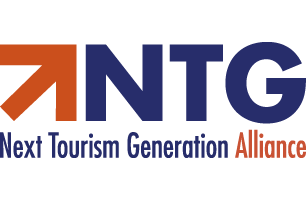Building on the academic research on skills development in tourism over the past years (fundamental and applied), NTG research in collaboration with organizations and universities have achieved positive outcomes both in quantity and relevance of research production, a critical mass of capacity, and a close connection to education and academic and professional partners.
数字技能鸿沟:证据from the European tourism industry
本文旨在从欧元呈现研究结果opean study, conducted under the flag of the Next Tourism Generation (a project co-funded by the Erasmus+ Programme of the European Union) on the digital skills gaps in tourism and hospitality companies. Mixed methods research was adopted. The sample includes 1,668 respondents (1,404 survey respondents and 264 interviewees) in 5 tourism sectors (accommodation establishments, tour operators and travel agents, food and beverage operations, visitor attractions, and destination management organisations) in 8 European countries (UK, Italy, Ireland, Spain, Hungary, Germany, the Netherlands, and Bulgaria).
Service robots as a tool for physical distancing in tourism
COVID-19 pandemic is affecting negatively the tourism and hospitality industry. As people must avoid physical interaction, service robots can be a useful tool to ensure a high level of physical social distance during the epidemic. This paper discusses whether the application of service robots to provide physical distance in the tourism and hospitality context is going to be beneficial or there will be side effects as well. The paper posits that service robots create a technological shield between tourists and employees that increases the physical and emotional distance between them.
Environmental Skills Gaps in Tourism and Hospitality Organisations: Evidence from Europe
This research analyses the current self-reported level of proficiency of environmental skills, the required future level of proficiency, and the gaps between them. Given the increasingly urgent need for the tourism industry to take action to support environmental management practices, this research provides evidence of key environmental skill gaps. Mixed methods research is applied where the sample includes 1404 respondents to a questionnaire and 264 interviewees from senior management of organisations from five tourism sectors (accommodation establishments, food and beverage outlets, destination management organisations, tour operators and travel agents, visitor attractions) in eight European countries. Analysis of variance, t-tests, correlation and cluster analyses, and Pearson Chi-square tests were employed for data analysis. The findings revealed that the country of registration, the size and the tourism sector type influence significantly the current and future proficiency levels of environmental skills, and the gaps between them. Most respondents did not receive environmental skills training. Theoretical, managerial and policy implications are also discussed.
The Imperative to Address Sustainability Skills Gaps in Tourism in Wales
Tourism is fundamental to the economy of Wales, and the government tourism plan 2020–2025 centres on sustainable development. This paper presents a quantitative analysis of research undertaken by the Next Tourism Generation Alliance (NTGA) project in Wales evidencing sustainability skills gaps. Survey data collected from five tourism sectors, accommodation, food and beverage, destination management, visitor attractions, travel agents and tour operators, show that the highest green and social skills gaps were identified in food and beverage businesses, whilst accommodation reported the lowest skills gaps.




